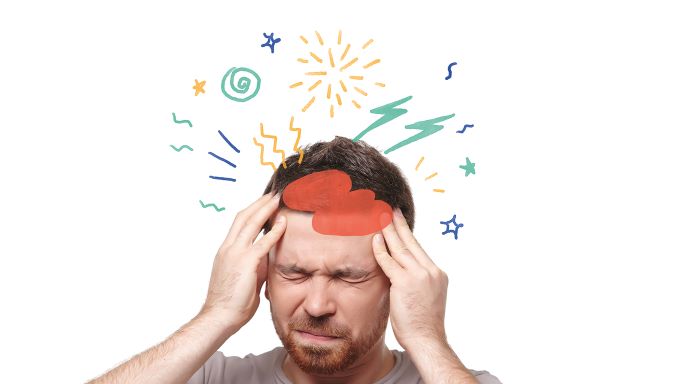A lot of people suffer from headaches. That is why it is worth reading about it.
Is it caused by Dengue or pollution? Or is it caused by too much stress or traffic?? It is a very common complaint. Most headaches are not serious. This article is written to learn more about the different types of headaches.
A lot of headaches can be treated with simple painkillers and lifestyle changes, like rest and drinking fluids. If your headaches are very painful or frequent that they affect your daily life it is better to see your GP.
Tension headaches
Tension headaches are also known as the normal, “everyday” headaches. They feel like a constant ache, a tight band on both sides of the head. The ache normally lasts for 30 minutes but it can last for a few days. There is no clear exact cause but there could be a relation with stress, poor posture, skipping meals and dehydration.
Tension headaches can be treated with painkillers such as paracetamol and ibuprofen. Lifestyle changes, such as sufficient sleep, less stress and drinking plenty of fluids may also help.
Migraines
Migraines are usually felt as a throbbing pain at the front or side of the head. Other symptoms can include nausea, vomiting and increased sensitivity to light or sound. They can stop you from carrying out your daily activities. They usually last a couple of hours and some people stay in bed for days.
Migraines can be treated with over-the-counter medication. If they’re severe, you may need stronger prescribed medication. This can relieve and prevent migraines.
Cluster headaches
Cluster headaches are a type of headache that occur in clusters for a month or two around the same time of year.
They’re very painful, causing pain around one eye, and can have other symptoms, like a watering or red-eye and a blocked nose.
Normal pain medication doesn’t ease a cluster headache, but a doctor can prescribe medication to ease the pain and prevent further attacks.
Medication and painkiller headaches
Some headaches are a side effect of a particular medication. Headaches can be caused by taking too many painkillers. This is known as a painkiller or medication-overuse headache.
They will usually get better within a few weeks after stopping the painkillers that are causing it.
Hormone headaches
Headaches in women can be caused by hormones, and they may link with periods. The combined contraceptive pill, menopause and pregnancy are also potential triggers. Regular sleep, reducing stress levels and regular meals may help reduce hormone headaches.
Other causes of headaches
- Alcohol
- Head injury or concussion
- A cold or flu
- Problems with the “chewing” muscles (the joints between the lower jaw and the base of the skull)
- Sinusitis
- CO2 poisoning
- Sleep apnea
Also Read How to deal with hangovers!
Anything more serious?
Rarely, it can be a symptom of a serious condition such as a stroke, meningitis or even a brain tumor.
This is more likely if:
- The onset is sudden and the pain is severe
- The pain is not reducing and gets worse
- After a severe head injury
- Triggered by coughing, laughing, sneezing, or physical exertion
- If you have symptoms like weakness, slurred speech, confusion, memory loss and drowsiness
- If you have symptoms, like a fever, a stiff neck, a rash, jaw pain, vision problems, a sore scalp, or severe pain and redness in one of your eyes
Good Practice provides trusted medical practitioners who can help you. We now have patients from 75 countries. Our latest addition was Mozambique. Try our English speaking team!
Dr Steven Graaff, MD, MRCGP, the founder of Good Practice Clinic is a graduate of the Vrije Universiteit Amsterdam. Before completing his formal training in General Practice in the UK, he has worked in several hospitals, occupational health and general practice in the Netherlands and the UK. As a medical professional with international experience, Steven decided to start his own clinic – Good Practice, in Jakarta.




